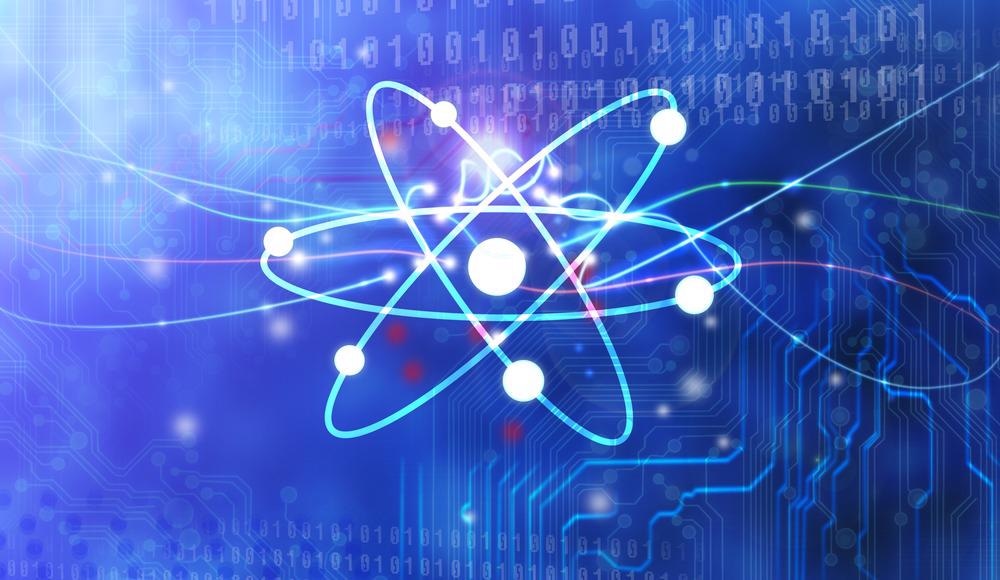Quantum biochemistry employs the ideas and methods of wave mechanics and uses them to study the electronic characteristics of molecules to understand their behavior as biological substrates, and their involvement in both the biophysical and biochemical processes stop they are involved in.
Quantum biochemistry is based on quantum mechanical theories of chemical bonding, and reactivity. It uses these quantum mechanical principles in the context of biochemical and biophysical problems. It has been fundamental in determining the physical basis of enzyme catalysis, as well as vision and other biological phenomena.
Several studies support the use of quantum biochemistry for the analysis of biological problems that include enzyme catalysis, ligand design, biomimetics, and systems biology.

Image Credit: winui/Shutterstock.com
Defining Quantum Indistinguishability - An Example of the Effect of Quantum Biochemistry
Quantum indistinguishability refers to the inability to tell apart quantum particles. This occurs as a result of the inability to determine the exact position of quantum particles. Therefore, when two particles interact at the same place, it is not possible to determine which is which.
Low temperatures result in large numbers of particles behaving in the same way. However, some quantum particles are not indistinguishable. Electrons are an example of such a quantum particle, and the Pauli exclusion principle states that they are not able to share the same state.
This separates the fields of physics and chemistry, and due to the absence of indistinguishability in chemistry, the laws of quantum indistinguishability have largely been ignored. This is particularly true as indistinguishability occurs readily at low temperatures, while chemistry requires relatively high temperatures – at which point objects lose their quantum properties.
More recently, however, researchers have concluded that quantum indistinguishability does play a significant role in some chemical processes at ordinary temperatures. Even at room temperature, the influence of quantum indistinguishability is thought to lead to new chemical phenomena such as isotope separation.
This effect can also explain the enhanced chemical activity of reactive oxygen species. So, while quantum properties are illuminated at higher temperatures, some quantum phenomena continue to persist. This has implications for the way molecules interact. Therefore, quantum indistinguishability influences how molecules can fit together as it prevents interactions that don't match the nucleus symmetrically.
This implication is particularly important in enzymatic catalysis. This is because, for example, a water molecule, which contains two hydrogen nuclei, is influenced by quantum effects. Hydrogen nuclei can either spin in the same direction or opposite directions. When they spin in the same direction the molecule is known as ortho; in the opposite direction, the molecule is para. these different arrangements are known as spin isomers – and have implications for how water molecules interact with one another. Moreover, how water molecules interact with one another affects the rate of chemical reactions.
The Effect of Quantum Biochemistry in Cancer Immunotherapy
Typically, modern-day immunotherapy is used to treat cancer. Monoclonal antibodies are employed to inhibit checkpoint proteins and are considered to be a milestone achievement among cancer immunotherapy researchers.
Through quantum biochemistry and molecular dynamics simulation, researchers can comprehend how complexes are formed by monoclonal antibodies and their checkpoint inhibitor targets. One such example is the monoclonal antibody ipilimumab and its target checkpoint protein CTLA-4. Research has demonstrated that computational results based on quantum biochemistry have provided an enhanced understanding of the binding mechanisms and new insights into the CTLA-4:ipilumumab complex.
Quantum biochemistry analysis has also revealed the specific amino acid residues that are involved at the interface between the checkpoint protein and monoclonal antibodies. As such, it has been used to design synthetic peptides to inhibit CTLA-4. This study provides a proof of concept, demonstrating that quantum biochemistry can help enhance understanding of binding mechanisms, thereby supporting the development of alternative, and novel, antibody-based drugs which have greater efficacy and relevance in the field of cancer immunotherapy.
Quantum mechanics has a valuable place in being able to define the intermolecular interactions in reaction energies and pathways. In addition, quantum mechanics can be used to compute observable phenomena. Indeed, quantum biochemistry is important to define complex interactions and chemical rearrangements, while future implications are therapeutics.
References:
- Cui Q. (2016) Perspective: Quantum mechanical methods in biochemistry and biophysics. J Chem Phys. doi:10.1063/1.4964410.
- Technology review period how quantum physics is about to revolutionize biochemistry. Available at: https://www.technologyreview.com/2017/08/01/150200/how-quantum-physics-is-about-to-revolutionize-biochemistry/. Last accessed December 2021.
- Amaral JL, Santos SJM, Souza PFN, et al. (2020) Quantum biochemistry in cancer immunotherapy: New insights about CTLA-4/ipilimumab and design of ipilimumab-derived peptides with high potential in cancer treatment. Mol Immunol. doi: 10.1016/j.molimm.2020.09.013.
Further Reading
Last Updated: Jan 24, 2022